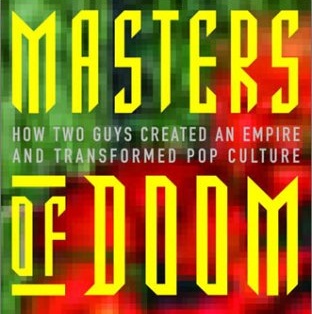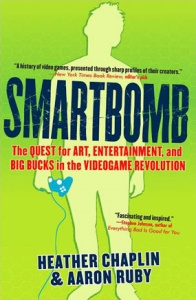
I’ve always been fascinated with game industry stories. From the first day I started in the business, I’ve always been eager to hear anecdotes from other people that had seen and heard so much. Many years on now, I’ve some of my own stories. Some of which I’m actually part of myself. It’s kind of surreal to feel like I’m on that other side of the fence now.
Recently I picked up this book again: “Masters of Doom”, by David Kushner. It’s the third time I’ve read through it. Nuts eh? I don’t think I’ve ever read any kind of book that many times over. It’s just a very well told account of id Software‘s birthing, and what happened to the key employees up until around 2003. I’ve recommended it to several people over the past couple of years, since I first picked it up. In fact it was suggested to me in the first place by a coder colleague here at Neversoft.
I think what had me going back to it again, was how inspiring a story it is. From being a kid who downloaded the Wolf3D shareware originally from a BBS, and picked up the Doom the same way. The stories in the early half of the book are amazing to me. These people created their own genre, they created groundbreaking tech. To a kid fascinated with videogames, and computer programming these people were my gods!
As someone now who’s all grown-up, and has coming up to a decade of time in the industry under my belt. These stories still resonate with me, they’re extremely inspiring, and make you believe that there’s still room for innovation in the future. I think these days with conservative big-time publishers, you only see that innovation in the indie scene. I really can see something very special coming out of that section of the industry soon.
What else is out there?
Well, that’s what prompted this post really. There really isn’t anything that comes close to this book right now. There’s a real gaping hole here for this stuff. You might say that people interested in the inner workings of the games industry are a very small group. But really, I don’t think this is the case. Even if you remove the gaming part completely, it’s a great account of a technical-led success story. I’m sure books about Steve Jobs and Bill Gates fly off the shelves. I can’t see why the same can’t be true about this material either.
There are a couple that I managed to find that I thought could be good reads. The first one looked initially very promising, but on reading the Amazon reviews I was greatly turned off. The book in question being: Rogue Leaders: The Story of LucasArts. I adored playing the old point-and-click LucasArts adventure games, so reading about these seemed a real treat. The reviews however mention that these games are only discussed very briefly, and in no sort of detail at all. So not my cup of tea, I’m not much of a Star Wars fan.
The second book I actually did pick up, and have got just over halfway through. It’s SmartBomb. It’s been a bit of a slog and I think I’m going to give up on it now. The story about how Atari started was a high-point, interesting stuff that I’ve not heard about before. But on the other hand you have a poorly-researched version of how id Software got big, and lots of fluff about gaming tournaments and CliffyB’s visits to trade shows.
The id mistakes were odd. They mentioned their key titles which “started it all” were “Return to Castle Wolfenstein, Doom, and Quake”… Doh! To spare their blushes though, they do refer to the correct name “Wolfenstein 3D” later on in the chapter. The other doozy I remember was saying that they were told to “make three games, we’ll give away the first two for free and sell the third”. They then referred to that as being Shareware. That’s probably how my mum would try and describe how Shareware works, if in some bizarro-world she was researching a book like this.
The CliffyB stuff could have been so much better if they had talked some about how he got into the industry in the first place. I still have no idea if he ever wrote code himself. I mean take Sid Meier, he actually coded Civilization as well as designing it. Not that it takes away from his designer skills if he’s not a coder. I’m just curious, I enjoyed ‘Jack Jackrabbit’ back in the day. In the book his early days are relegated to one sentence that mentions he sent off a floppy disk in a ziploc bag. MobyGames actually says he did some games before Jack, but his role isn’t clear. At least one seems to indicate he did the whole thing himself. Anyway, this is a far more entertaining CliffyB story. Even though it is completely made up. 🙂
Engerlund, Engerlund!
As I tend to do when I write these blog posts, I’m going off track. The real point of this post, and the namesake of the post itself is about British game developers. Why is there absolutely nothing written about them in books? I also feel whenever I read any sort of modern game website about the ‘good old days’; it’s always just Atari, Nintendo and the Apple II. There was another golden-age of gaming, from the mid 80’s through to the early 90’s. This one occurred and originated in Britain. Take the Spectrum, the C64 (and the Amstrad!). Then you’ve got the Amiga, and in turn some PC and console conversions of the same games. There’s so many good games for those systems. Nowadays though whenever a modern site like Kotaku gets misty-eyed, it’s like these games never existed.
Elite? I don’t think I’ve met an American who knows what that game is. Manic Miner? No chance.
Manic Miner is a good one to pick up on. It pre-dates “Super Mario Bros.” on the NES by almost two years. Whilst it’s missing the scrolling element of Mario, it was at the time a revelation in the British home computer market. The author, Matthew Smith famously dropped off the face of the planet after the follow-up: “Jet Set Willy”. He apparently joined a commune in The Netherlands, and stayed there for a number of years. Take a gander at this YouTube clip for some nostalgia. The gangly-guy on the new “Doctor Who?” is the Matt Smith eh? No, Mr. Manic Miner is the Matt Smith, and always will be. 🙂
“our really sad friends even wrote their own”
Seriously though, how is Matt’s story not interesting? If you can’t fill up a whole book with it (which really is questionable), why not add some other figures from the same era?
Take ‘Magnetic Scrolls’. A company which funnily enough was just a short drive from where I grew up. Nestled alongside what was the first ‘Special Reserve’ game shop in the country. I remember passing by it as a youngster and really wanting to go in that office. My own personal nostalgia aside, they made some great games. Text-adventures, a lost artform but at the time were hugely popular. (I was also a great fan of ‘Level 9’, another British text-adventure company).
Magnetic Scrolls had connections with Infocom and Douglas Adams. Douglas Adams being of “Hitchhikers Guide to the Galaxy” fame. They were actually at one point working on the sequel to that game. Seems that some people working there were good friends with Adams. You just need to skim the link about the sequel to Hitchhikers to realize that there’s a hell of a lot to that story, and in turn the story of Magnetic Scrolls.
That’s just a couple of examples. Here’s a few more I can think of:
- Elite. Just mentioning this one again. Braben has his own company now, curious as to why Ian Bell didn’t join him. The game itself was a groundbreaking use of procedurally-generated worlds on a huge scale.
- Mythos Games. Laser Squad, Lords of Chaos, and the X-COM/UFO games of course. Turn-based strategy joy.
- Imagine. No really outstanding games I remember, but there’s a very interesting backstory about how piracy killed the company.
- Codemasters. The Darling brothers, and the Oliver twins. Redefined the pricing model for games at the time, selling (mostly) quality newly developed games at budget prices.
- The Bitmap Brothers. Speedball and The Chaos Engine. Outstanding art-style. Best looking games out at the time.
- Psygnosis. Nuff said. They are now SCEE Liverpool.
- Rare. Killer Instinct, Goldeneye 64, Donkey Kong Country. They used to be ‘Ultimate: Play The Game’. Sure there’s a good story there. Throw in some ‘Mr. Pants’ and it’s gold.
- Molyneux and Bullfrog; Syndicate, Populous, Dungeon Keeper, Magic Carpet. All groundbreaking, classic games.
- The GTA guys up at Rockstar North. Tie in the DMA design days too, and you’ve quite a story. Lemmings is an all-time great.
Anyway, just some food for thought. There’s a gap in the market here for someone willing to put in the research time. Can’t see why it wouldn’t sell well. The GTA stuff would probably sell it in the States! 🙂



I could read Masters of Doom over and over again. The two John’s are just like my brother and I. It was WONDERFUL to read a book and relate to their struggles (and to see why they succeeded at the same things we did not succeed at). So inspirational.